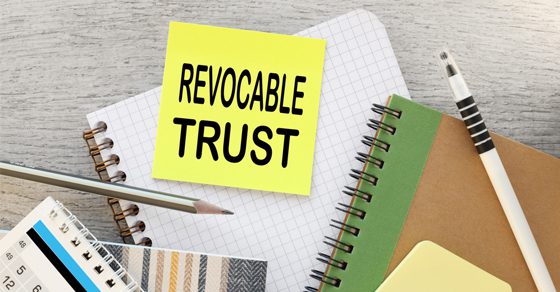 A revocable trust (sometimes referred to as a “living trust”) is a popular estate planning tool that allows you to manage your assets during your lifetime and ensure a smooth transfer of those assets to your family after your death. Plus, trust assets bypass the probate process, which can save time, reduce costs and maintain privacy. However, like any legal instrument, a revocable trust has certain disadvantages.
A revocable trust (sometimes referred to as a “living trust”) is a popular estate planning tool that allows you to manage your assets during your lifetime and ensure a smooth transfer of those assets to your family after your death. Plus, trust assets bypass the probate process, which can save time, reduce costs and maintain privacy. However, like any legal instrument, a revocable trust has certain disadvantages.
How a Revocable Trust Works
A revocable trust’s premise is relatively simple. You establish the trust, transfer assets to it (essentially funding it) and name a trustee to handle administrative matters. You can name yourself as trustee or choose a professional to handle the job. Regardless of who you choose, name a successor trustee who can take over the reins if required.
If you designate yourself as the trust’s initial beneficiary, you’re entitled to receive income from the trust for your lifetime. You should also designate secondary beneficiaries, such as your spouse and children, who are entitled to receive the remaining assets after the trust terminates.
Assets You Can Transfer to a Revocable Trust
You can transfer a variety of assets to a revocable trust, including:
-
Real Estate – Primary residences, vacation homes, rental properties, and land. You’ll typically need to execute a new deed to transfer ownership to the trust.
-
Bank Accounts – Checking accounts, savings accounts, money market accounts, and certificates of deposit (CDs). Be sure to check with your bank on their transfer requirements.
-
Investment Accounts – Brokerage accounts, stocks, bonds, and mutual funds. Contact your financial institution to re-title these accounts in the name of the trust.
-
Personal Property – Valuables like jewelry, artwork, collectibles, and antiques. A bill of sale can be used to document the transfer.
-
Business Interests – Ownership in LLCs, partnerships, or corporations. Ensure the transfer complies with any applicable operating agreements or shareholder agreements.
-
Life Insurance Policies – You can name the trust as the beneficiary of your life insurance policy, although the policy itself isn’t typically transferred.
-
Vehicles – Some states allow vehicles to be titled in the name of a trust. Consider any implications for insurance and registration.
-
Intellectual Property – Copyrights, patents, trademarks, or royalties can be assigned to a trust.
-
Promissory Notes – If you hold a promissory note where someone owes you money, it can be transferred to the trust.
You should not transfer retirement accounts (e.g., IRAs, 401(k)s) as that will trigger a taxable event. Instead, consider naming the trust as a beneficiary.
In addition, Health Savings Accounts (HSAs) and Flexible Spending Accounts (FSAs) are considered individual accounts and cannot be transferred. For HSAs, if you don’t use the funds during your lifetime, you can designate a beneficiary. If you designate your spouse, they can inherit it and treat it as their own with the same tax-advantaged benefits. If you designate a non-spouse, the HSA will be closed and the funds become a taxable event to the beneficiary.
FSAs are typically “use it or lose it” accounts and therefore you should use the funds before the plan’s deadline (or grace period). FSAs do not allow for beneficiaries since the funds are forfeited upon the account holder’s death. However, each FSA plan has its own rules regarding post-death claims. Check the specific plan’s Summary Plan Description (SPD) for details.
Why a Revocable Trust
One of the primary benefits of a revocable trust is its flexibility. As the grantor, you retain control over the trust and can change its terms, add or remove assets, or even dissolve it at any time during your life. This control makes it a flexible tool for adapting to changing life circumstances, such as new family members, changes in financial status or shifts in your estate planning goals.
For many people, the main reason for using a revocable trust — and sometimes the only one that really matters — is that the trust’s assets avoid probate. Probate is the process of settling an estate and passing the legal title of ownership of assets to heirs specified in a will. Depending on applicable state law, probate can be costly and time consuming. The process is also open to the public, which can be a major detriment if you treasure your privacy.
Assets passing through a revocable trust aren’t subject to probate. This gives you control to decide who in the family gets what without all the trappings of a will. Along with the flexibility, it keeps your personal arrangements away from prying eyes.
Potential Drawbacks of a Revocable Trust
One of the most notable drawbacks of a revocable trust is the upfront cost and effort involved in setting one up. Drafting a revocable trust requires the assistance of an attorney. You’ll also need to retitle your assets under the name of the trust, which can be time consuming and may incur fees.
Another limitation is that a revocable trust doesn’t provide asset protection from creditors or lawsuits during your lifetime. Because the trust is revocable, its assets are still considered your property and are thus subject to claims against you.
Finally, despite a common misconception, revocable living trusts don’t provide direct tax benefits. The assets are included in your taxable estate and dispositions of trust property can result in tax liability. You must report the income tax that’s due, including capital gains on sales of assets, on your personal tax return.
Talk With Your Tax and Legal Team First
For many individuals, a revocable trust can be an invaluable part of their estate plans, offering flexibility, privacy and efficiency. However, it’s not a one-size-fits-all solution. Before deciding, weigh the benefits and drawbacks in the context of your unique financial situation and estate planning goals. Contact us with questions regarding a revocable trust. Be sure to consult with an estate planning attorney to draft your revocable trust.



